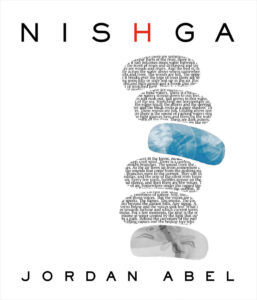June 14, 2021
NISHGA, by Jordan Abel
With his first two books, award-winning poet Jordan Abel’s conceptual writing allowed him a fascinating avenue by which to consider notions of Indigenous identity and cultural appropriation, but also—as he writes about in his latest, and painfully personal, book NISHGA—for him to engage with his own lack of connection with the Indigenous culture of his father and grandparents—the land, cultural knowledge and language of the Nishga people. The appropriative works he dismantles with his poetry are significant for being a primary way in which he’s been able to engage with Indigenous culture as someone who was raised apart from his community.
“Where do you come from?” A complicated question for many people, and especially for Abel, raised in Ontario by his white mother, far from British Columbia and his father and grandparents whose lives had come to be defined by violence and abuse originating from their experiences at the Coqualeetza Indian Residential School.
Abel’s father was an artist. Ironically, he notes, his father Lawrence Wilson, whom he barely knew, designed the logo for the Vancouver Aboriginal Child and Family Services Society.
Throughout NISHGA, Abel uses his father’s art, superimposing his images with photography and text, connecting and engaging with, and disassembling. These images are included alongside government records, transcripts of talks Abel has given, and other notes and pieces about his experience as an Indigenous writer in Canada.
NISHGA is a complicated, vulnerable, brave and considered answer to the “Where do you come from?” question. Abel wrote this book, he explains, so that other Indigenous people raised apart from their cultures will understand that they are not alone in their experience.
For the rest of us, NISHGA, artfully, originally, continues to underline the enormity of the legacy of Canada’s Residential School system, and the questions of identity that many Indigenous and non-Indigenous people rarely even consider.






